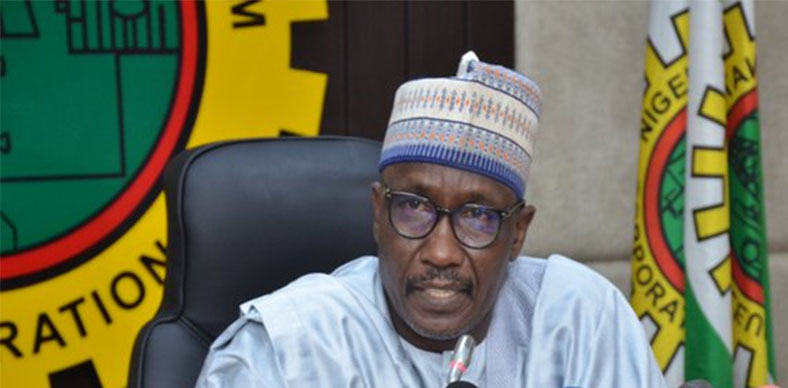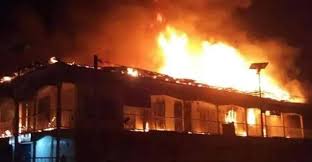
Fuel crisis lingers as NNPC seeks fresh $2bn crude-backed loan
According to Group Chief Executive Officer of NNPC Mele Kyari, the Nigerian National Petroleum Company Limited is in negotiations for another loan backed by oil to strengthen its finances and permit investment in its operations.
According to people with knowledge of the matter, the oil company wants to use the new loan proposal to raise at least $2 billion.
NNPC declared in August 2023 that it has obtained a $3.3 billion emergency credit from the African Export-Import Bank to repay crude oil.
The national oil firm is planning to increase the amount of its crude-backed loans to $5.3 billion when the $3.3 billion loan is added to the $2 billion newly planned loan.
As of Tuesday at press time, we were unable to determine how much of the $3.3 billion loan had been returned by the oil corporation.
Reuters claimed on Tuesday that Kyari stated the company was seeking a fresh loan in relation to its daily output of between 30,000 and 35,000 barrels of crude oil, but he did not specify how much money was being sought.
This occurred on Tuesday when lines for Premium Motor Spirit, also known as gasoline, continued to form in Abuja and the surrounding states as well as in Lagos, the commercial hub of Nigeria.
Marketers attributed this on NNPC's lack of supplies, as they are the only company importing PMS into Nigeria. Because they were unable to obtain US money, other dealers ceased importing the product.
Additionally, marketers cautioned NNPC against collecting debts backed by crude as they hoped the scenario wouldn't worsen things for Nigeria's oil industry.
Additionally, according to Reuters, NNPC's indebtedness to petrol suppliers had doubled in the last four months to hit $6bn. This was, however, countered by the spokesperson of NNPC, Olufemi Soneye.
“False. Did they name the marketers they claim we supposedly owe? Let them name them,” Soneye had told our correspondent while responding to the Reuters report.
Nigeria’s government finances rely on the oil the NNPC exports and oil provides the bulk of crucial foreign exchange reserves. But pipeline theft, and years of underinvestment, have sapped oil production in recent years, and the cost of fuel subsidies has further depleted cash reserves.
President Bola Tinubu has been fighting to enact changes in the largest oil exporter in Africa, such as doing away with fuel subsidies and letting the naira trade near market rates, without driving the nation's population over the edge of destitution due to rising living expenses.
Kyari stated that NNPC was looking for a loan secured by its daily output of between 30,000 and 35,000 barrels of crude oil, but he would not reveal how much. He declared that all the NNPC's economic endeavours, including bolstering production expansion, will be funded by the money obtained.
"We have no trouble paying for our petrol. This is not a desperate move; it's just money for regular business," Kyari told Reuters.
He stated that he anticipated closing the sale in the following two months. "It will be a syndication with critical but regular partners who have been in business with our company to forward the cash," he said.
Although NNPC already had a $3.3 billion oil-backed loan through Afreximbank, five sources claimed that the company's cash flow problems were worsened by the rising cost of fuel subsidies and that the additional loan would enable it to settle those bills.
Three sources claimed that Afrexim would not be able to increase its exposure to Nigeria to that extent, thus it is unclear which lender would arrange the loan. Since none of the five persons who talked with Reuters had the authority to speak publicly about the matter, they all requested anonymity.
Certain oil trading companies have already stopped participating in NNPC’s tenders for petrol because the overdue bills have pushed their exposure to Nigeria above the levels their companies allow.
Tinubu announced the removal of costly fuel subsidies shortly after he took office last year, allowing pump prices to triple. Subsidies – which critics say are an inefficient tool that benefits mainly elite, city-dwelling car owners – have been a drain on Nigeria’s finances for years.
But given the pain of double-digit inflation, NNPC capped average fuel prices at just above N600/litre a year ago – a price that has become further from market levels since the naira fell and global oil prices rose.
Fuel queues began forming last week in Lagos as Abuja petrol marketers stopped selling. Sources said the ex-depot price in Lagos is above N700/litre, meaning stations would lose money if they sold at the capped prices.
In the upcoming weeks, the 650,000-barrel-per-day Dangote refinery on the outskirts of Lagos plans to start manufacturing petrol and open a new tab. However, the refinery would be hesitant to sell at a loss inside Nigeria or wait months for payments from the NNPC because it has loans and feedstock costs in US dollars.
According to the sources, pressure on the government to raise pump prices has increased, but officials are anticipated to be cautious because of the tragic protests in Kenya that caused the government to rescind its intentions to raise taxes.
The President of the Petroleum Products Retail Outlets Owners Association of Nigeria, Billy Gillis-Harry, responded to the fuel supply situation in Nigeria and the proposed loan by NNPC by saying that although the national oil company was making great efforts to clear the backlog, marketers were still anticipating products from the company.
"NNPC has given us their word that they are making every effort to address the fuel supply problems. As NNPC is still the only importer of PMS into Nigeria, which has proven difficult, so we are anticipating items from them," he said.
The president of PETROAN cautioned the oil company to proceed cautiously with the proposed load, stating that "it is true that they need the funds to boost investments, but they must be sure that in the long run it would be of benefit and not detrimental to the oil sector.”
Earlier crude-backed loan
On August 17, 2023, it was reported that the NNPCL announced that it had secured a $3.3bn emergency crude oil repayment loan from the African Export-Import Bank.
It had explained at the time that the loan would be used by the oil company to support the Federal Government in stabilising Nigeria’s exchange rate.
In June this year, it was also reported that the Federal Government received a lifeline of $925m from Afrieximbank to boost the forex market and meet its dollar obligations.
According to the source, Afreximbank announced a $925 million extra disbursement under the NNPC-sponsored syndicated $3.3 billion crude oil-backed prepayment facility.
Among other things, the facility will support NNPC, aid the Federal Government meet some of its dollar obligations, and help the Central Bank of Nigeria calm the foreign exchange market.
With the accordion payment from Afreximbank to Project Gazelle Funding Limited, the overall funded facility amount increased to $3.175 billion.
Through the accordion arrangement, which was organised and managed by Afreximbank, a group of crude oil off-taker lenders, including but not limited to the Oando Group and Sahara Energy Resource Limited, raised a total of $925 million.
Including information about the transaction in the document "Everything you need to know about the NNPC Limited’s $3.3bn loan, also known as Project Gazelle,” NNPC said, “This is a financing agreement secured by NNPC Limited to prepay future royalties and taxes to the Federal Government.”
The company also stated that it adopted a lower price benchmark for the $3.3bn crude-for-cash loan to reduce the risk of default and ensure financial stability.
Giving details on the benchmark oil price, the company said the facility was using a conservative crude price of $65/barrel to calculate the allocated crude to be produced and sold in the future.
"This gives a safety cushion against future price swings.For Project Gazelle, NNPC Limited has set aside up to 90,000 barrels of petroleum, guaranteeing enough cash flow for loan repayment and other commitments.
"A higher oil price will result in more revenue from the sale of the 90,000 barrels, enabling a quicker repayment schedule. But if oil prices drop, the payback period might lengthen.
"The 90,000 barrels of designated crude are proportioned to guarantee there is sufficient cash on hand for the facility's repayment when it is due. Taking into account the anticipated future price of crude oil globally, this also guarantees that NNPC Limited can fulfil other cash flow responsibilities," the statement read.
Additionally, according to NNPC, repayments were well thought out and linked to future oil sales, with cautious contract pricing reducing the risks brought on by fluctuations in oil prices.





